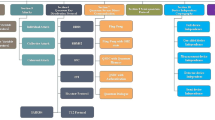Abstract
Semi-quantum private comparison protocol permits two classical participants to compare the equality of their private information with the help of a semi-honest third party without disclosing privacy. An innovative semi-quantum private comparison protocol based on maximally entangled Greenberger–Horne–Zeilinger-type states has been discussed. The proposed protocol is efficient and without the pre-shared keys. Next, the security analysis guarantees the presented protocol is asymptotically secure against the outsider and the insider attacks. Moreover, the qubit efficiency of the presented protocol is 3.125%. The efficiency comparison shows that it improves the efficiency by 125% for the literature without pre-shared keys.

Similar content being viewed by others
References
Bennett, C.H., Brassard, G.: Quantum cryptography: public key distribution and coin tossing. In: Proceedings of the IEEE International Conference on Computers, Systems and Signal Processing, Bangalore, pp. 175–179 (1984)
Liu, X., Hersam, M.C.: 2D materials for quantum information science. Nat. Rev. Mater. 4(10), 669–684 (2019)
Long, G.L., Liu, X.S.: Theoretically efficient high-capacity quantum key distribution scheme. Phys. Rev. A 65(3), 032302 (2002)
Li, L.L., Li, J., Li, C.Y., et al.: Deterministic quantum secure direct communication protocol based on Omega state. IEEE Access 7, 6915–6921 (2019)
Dong, Y., Wang, Y.K., Yuan, F., et al.: Bipolar-shell resurfacing for blue LEDs based on strongly confined perovskite quantum dots. Nat. Nanotechnol. 15(8), 668–674 (2020)
Williams, B.P., Lukens, J.M., Peters, N.A., et al.: Quantum secret sharing with polarization- entangled photon pairs. Phys. Rev. A 99(6), 062311 (2019)
Yao, A.C.: Protocols for secure computation. In: Proceeding of the 23rd Annual Symposium on Foundations of Computer Science, pp. 160–164 (1982)
Dou, Z., Xu, G., Chen, X.B., et al.: Rational protocol of quantum secure multi-party computation. Quantum Inf. Process. 17(8), 1–22 (2018)
Shor, P.W.: Polynomial-time algorithms for prime factorization and discrete logarithms on a quantum computer. Siam Rev. 41(2), 303–332 (1999)
Yang, Y.G., Wen, Q.Y.: An efficient two-party quantum private comparison protocol with decoy photons and two-photon entanglement. J. Phys. Math. Theor. 42(5), 30 (2009)
Li, Y.B., Qin, S.J., Yuan, Z., et al.: Quantum private comparison against decoherence noise. Quantum Inf. Process. 12, 2191–2205 (2013)
Li, Y.B., Wang, T.Y., Chen, H.Y., et al.: Fault-tolerate quantum private comparison based on GHZ states and ECC. Int. J. Theor. Phys. 52, 2818–2825 (2013)
Li, C.Y., Chen, X.B., Li, H.J., et al.: Efficient quantum private comparison protocol based on the entanglement swapping between four-qubit cluster state and extended Bell state. Quantum Inf. Process. 18(5), 158 (2019)
Bennett, C.H., Wiesner, S.J.: Communication via one- and two-particle operators on Einstein-Podolsky-Rosen states. Phys. Rev. Lett. 69(20), 2881–2884 (1992)
Boyer, M., Kenigsberg, D., Mor, T.: Quantum key distribution with classical bob. Phys. Rev. Lett. 99(14), 140501.1-140501.4 (2007)
Wang, M.M., Gong, L.M., Shao, L.H.: Efficient semi-quantum key distribution without entanglement. Quantum Inf. Process. 18(9), 1–10 (2019)
Tian, Y., Li, J., Yuan, K.G., et al.: An efficient semi-quantum key distribution protocol based on EPR and single-particle hybridization. Quantum Inf. Comput. 7–8, 563–576 (2021)
Yang, C.W., Tsai, C.W.: Advanced semi-quantum secure direct communication protocol based on bell states against flip attack. Quantum Inf. Process. 19(4), 1–13 (2020)
Li, Q., Chan, W.H., Long, D.Y.: Semi-quantum secret sharing using entangled states. Phys. Rev. A 82(2), 022303 (2010)
Tian, Y., Li, J., Chen, X.B., et al.: An efficient semi-quantum secret sharing protocol of specific bits. Quantum Inf. Process. 20, 217 (2021)
Chou, W., H., Hwang, T., Gu, J.: Semi-quantum private comparison protocol under an almost-dishonest third party. http://arxiv.org/pdf/quant-ph/160707961.pdf (2016)
Thapliyal, K., Sharma, R.D., Pathak, A.: Orthogonal-state-based and semi-quantum protocols for quantum private comparison in noisy environment. Int. J. Quantum Inf. 16(5), 1850047 (2016)
Lang, Y.F.: Semi-quantum private comparison using single photons. Int. J. Theor. Phys. 57(10), 3048–3055 (2018)
Ye, T.Y., Ye, C.Q.: Measure-resend semi-quantum private comparison without entanglement. Int. J. Theor. Phys. 57(12), 3819–3834 (2018)
Efficient semi-quantum private comparison using single photons: Lin, P., H., Hwang, T., Tsai, C., W. Quantum Inf. Process. 18, 1–14 (2019)
Yan, L.L., Zhang, S.B., Chang, Y., et al.: Semi-quantum private comparison protocol with three-particle G-like states. Quantum Inf. Process. 20(1), 1–16 (2021)
Zhang, W.W., Zhang, K.J.: Cryptanalysis and improvement of the quantum private comparison protocol with semi-honest third party. Quantum Inf. Process. 12(5), 1981–1990 (2013)
Yang, Y.G., Xia, J., Jia, X., et al.: Comment on quantum private comparison protocols with a semi-honest third party. Quantum Inf. Process. 12(2), 877–885 (2013)
Cabello, A.: Quantum key distribution in the Holevo limit. Phys. Rev. Lett. 85(26), 5635–5638 (2000)
Acknowledgements
This work was supported by the National Natural Science Foundation of China under Grant 92046001, 61962009, the Fundamental Research Funds for the Central Universities under Grant 2019XD-A02, the Open Research Project of the State Key Laboratory of Media Convergence and Communication under Grant KLMCC2020KF006. We also would like to thank the anonymous reviewers for their detailed review and valuable comments, which have enhanced the quality of this paper.
Author information
Authors and Affiliations
Corresponding author
Additional information
Publisher's Note
Springer Nature remains neutral with regard to jurisdictional claims in published maps and institutional affiliations.
Rights and permissions
About this article
Cite this article
Tian, Y., Li, J., Chen, XB. et al. An efficient semi-quantum private comparison without pre-shared keys. Quantum Inf Process 20, 360 (2021). https://doi.org/10.1007/s11128-021-03294-8
Received:
Accepted:
Published:
DOI: https://doi.org/10.1007/s11128-021-03294-8




